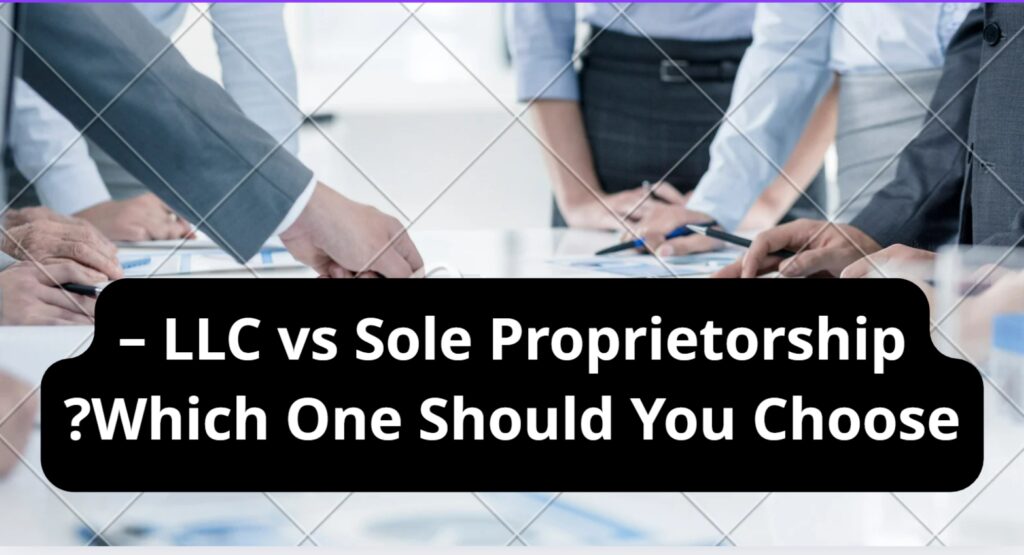Choosing the right business structure is one of the most important decisions you’ll make when starting a business in the United States. For small business owners, freelancers, and self-employed professionals, the choice often comes down to two popular options: the Limited Liability Company (LLC) and the Sole Proprietorship. This guide will explain the key differences between them in terms of liability, taxes, costs, formation, and compliance to help you decide which structure fits your needs

A Sole Proprietorship is the simplest and most common business structure. It’s not a separate legal entity. You and the business are legally the same. This means that all income, assets, and liabilities are personally tied to you. You don’t have to file any official documents to create a sole proprietorship—it’s created automatically when you start doing business as an individual. However, this also means that you are personally liable for all business debts, obligations, and lawsuits
An LLC, on the other hand, is a legal entity that exists separately from its owners (called members). It must be formed by filing formal documents with your state. LLCs provide limited liability protection, which means your personal assets—like your home, car, or savings—are typically protected from business-related lawsuits or debt. This structure is ideal for those who want legal separation between their business and personal life
Liability Protection
Liability is one of the biggest factors in deciding between the two. In a sole proprietorship, you have unlimited personal liability. If your business gets sued or owes money, your personal property can be used to satisfy those obligations. In contrast, an LLC limits your liability. Creditors and lawsuits generally can’t go after your personal assets unless there’s fraud or personal wrongdoing
The U.S. Small Business Administration outlines the basic differences and risks associated with each structure here:
🔗 SBA – Choose Your Business Structure
Taxes
In a sole proprietorship, business income is reported on your personal tax return using Schedule C with Form 1040. You pay income tax based on your total income, plus self-employment tax (15.3%) for Social Security and Medicare. The same applies to single-member LLCs, since the IRS considers them “disregarded entities” by default. However, an LLC can elect to be taxed as an S Corporation or C Corporation, potentially offering tax savings in some cases. Multi-member LLCs are treated as partnerships by default and file Form 1065 along with Schedule K-1 for each member
More details on tax treatment of LLCs can be found here:
🔗 IRS – Limited Liability Company (LLC)
Costs and Formation
A sole proprietorship requires no state filing to start, making it the most affordable structure. You may still need a local business license, fictitious name registration (DBA), or seller’s permit depending on your state and industry. LLCs require filing Articles of Organization with your state’s Secretary of State, which costs anywhere from $50 to $500 depending on the state. Some states also require an annual report or franchise tax
Many states offer online filing and resources for both LLCs and sole proprietors. You can find official links to your state’s registration portal via the National Association of Secretaries of State here:
🔗 NASS – Business Services Search
Ongoing Compliance
Sole proprietorships have minimal compliance requirements. You report income annually and handle taxes with your personal return. LLCs have more requirements, depending on the state. Common obligations include filing an annual report, paying a state fee, maintaining a registered agent, and keeping your business records up to date. If you elect corporate taxation for your LLC, you must also meet stricter accounting and payroll rules
Credibility and Branding
An LLC typically offers more professional credibility to clients, partners, and investors. Having “LLC” in your business name can make your company appear more established. It can also help when applying for business credit, opening a bank account, or working with larger companies. Sole proprietors may face difficulty in some cases since they operate under their personal name unless a DBA is registered
Which Should You Choose?
- Choose a Sole Proprietorship if: you’re testing a business idea, want to keep costs low, and are not worried about personal liability
- Choose an LLC if: you want personal liability protection, plan to grow, want flexibility in taxation, or need a more professional image
Ultimately, the decision depends on your risk tolerance, business goals, and budget. Many business owners start as sole proprietors and transition to LLCs as they scale. If you’re unsure, consult a licensed accountant or legal advisor to choose the best path for your situation.